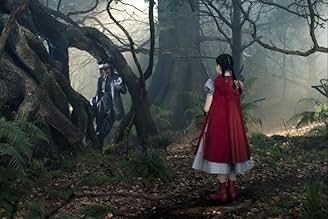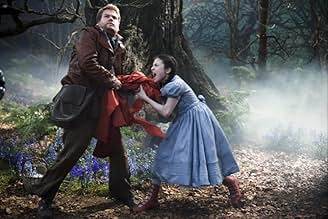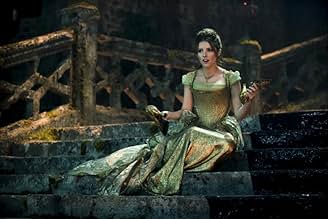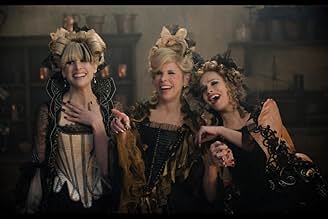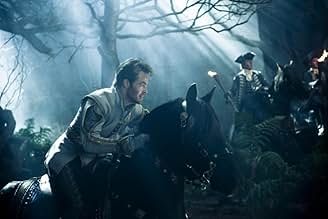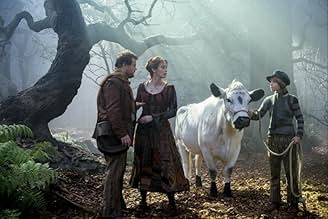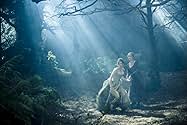Uma bruxa atribui a um casamento sem filhos a tarefa de encontrar uma série de objetos mágicos de contos de fadas para reverter a maldição de sua linhagem.Uma bruxa atribui a um casamento sem filhos a tarefa de encontrar uma série de objetos mágicos de contos de fadas para reverter a maldição de sua linhagem.Uma bruxa atribui a um casamento sem filhos a tarefa de encontrar uma série de objetos mágicos de contos de fadas para reverter a maldição de sua linhagem.
- Indicado a 3 Oscars
- 11 vitórias e 74 indicações no total
Enredo
Você sabia?
- CuriosidadesAt a Q&A session after a screening of the film, James Corden recalled an incident during rehearsals in which Meryl Streep jumped on a table and her foot got caught in her costume. She started falling backwards, head first, toward a concrete floor. Both Corden and director Rob Marshall froze in the fear that they were about to witness the death of Meryl Streep. However, a pregnant Emily Blunt stepped in and caught Streep before she hit the floor.
- Erros de gravaçãoThe witch says that she cannot touch the ingredients for the potion, but she leans her hand on the cow as Jack is milking her.
- Citações
Cinderella's Prince: I was raised to be charming, not sincere.
- Cenas durante ou pós-créditosThe Disney logo appears without music and fireworks, and is flanked by forest trees and the full moon, reflecting the woods setting of the story.
- ConexõesFeatured in Atop the Fourth Wall: The Hobbit #3 (2014)
- Trilhas sonorasPrologue: Into the Woods
Music and Lyrics by Stephen Sondheim
Performed by James Corden, Anna Kendrick, Daniel Huttlestone, Emily Blunt, Christine Baranski, Tammy Blanchard, Lucy Punch, Tracey Ullman, Lilla Crawford, Meryl Streep, and Company
Avaliação em destaque
I love Stephen Sondheim's musical classic Into The Woods, so I was more than excited to see Rob Marshall's new motion picture adaptation. Not only is Into The Woods one of my favorite musicals, but Rob Marshall was the director who brought Kander & Ebb's Chicago to the big screen in 2002 – an effort which resulted in the first musical to win the Best Picture Oscar since 1968! In fact, since Baz Luhrmann's Moulin Rouge update in 2001, several major musicals have been successfully adapted to the big screen – including Chicago, Dreamgirls, and the unfairly criticized Les Miserables just two years ago.
I hate to say it, but Into The Woods does not fall into this category. I found the film dreary, draggy, and quite frankly, boring. How can this be? It's the same dialogue, the same music, the same set, and the same costumes as we see on stage. But therein lay the problem. On stage, set designers create "the woods," and the actors move in and out of these woods. We use our imagination to pretend the woods are larger than what we see on stage. Here, the woods are huge. After all, these are the movies. Unfortunately, the woods all look the same. Marshall may as well have filmed a stage performance. Furthermore, the sky is always cloudy, giving the picture a dirty, dingy feel.
Into these woods, several classic stories interconnect, including Cinderella, Little Red Riding Hood, Jack & The Beanstalk, and Rapunzel. Tying all the stories together is the story of a baker and his wife, who are unable to conceive a child due to a curse placed on them by the witch who lives next door. On stage, characters from the various fairy tales bump into one another in hilarious fashion, and eventually all the loose ends are wrapped up and most of the characters live happily ever after.
But the film has one major flaw, and that is that the loose ends are tied up too soon. The sun finally shines on Cinderella's wedding day, as all the townsfolk join the celebration. I looked at my watch and realized we were only an hour Into The Woods, causing me to wonder what director Rob Marshall was going to do with the rest of the movie. On stage, Cinderella's wedding is merely a formality – a necessary conclusion to the story we all know, but certainly not the end of the musical. Here, Marshall gives the wedding scene such heft – and differentiates it from the previous hour's worth of material – that we feel like it's time to get up and leave.
At this point, the film version goes awry. The players begin behaving out of character for reasons never explained. For instance, how could the handsome prince consider Cinderella the love of his life one day, and then cheat on her the next? Why does Jack's mother die? (Her death is one of the funniest scenes on stage. Here, it happens so quickly, I wasn't even sure if she had died or not. And Jack's demeanor doesn't change one iota.) Another problem is Stephen Sondheim himself. You see, Sondheim is a lyricist. When he wrote the lyrics for Leonard Bernstein's West Side Story, the result was one of the best stage and screen musicals of all time. But when Sondheim writes his own melodies, the result is often wordy, tuneless ditties you won't remember two minutes after leaving the theatre. Again, on stage this is no big deal. In fact, it almost accentuates the material to feature the characters speaking and singing in similar speech patterns. But on screen, I had that, "Not another song!" feeling all through the third act – the way I did with Barbra Streisand's Yentl back in 1983.
I certainly can't knock the performances, although Anna Kendrick's remarkable turn as Cinderella is the only one that stands out from the rest. Her character seems genuine, and she gives Cinderella a few new dimensions, rather than simply fulfilling the role we think we know from the fairy tale. Three-time Oscar winner Meryl Streep has been nominated for another Best Supporting Actress Oscar for her role as the witch. She's fine, but she won't win. I could name at least a dozen Streep performances better than this one.
It's a disappointment to me that Into The Woods didn't adapt better to the big screen. That makes three films this season that I really wanted to like, and was disappointed at the outcome – Birdman, Inherent Vice, and now Into The Woods. Throughout the course of motion picture history, it often seems as though the best musicals are those written directly for the screen, such as Singin' In The Rain or Mary Poppins. Adapting material from another source is always risky. Sometimes it works and sometimes it doesn't. As I've thought more about Into The Woods, I wonder if this isn't one of those musicals that simply wasn't meant to adapt to the screen. Remember Richard Attenborough's inexcusable A Chorus Line? That's another great, intimate show that simply doesn't work on the large easel of the motion picture screen. I fear that's what we have here with Into The Woods.
I hate to say it, but Into The Woods does not fall into this category. I found the film dreary, draggy, and quite frankly, boring. How can this be? It's the same dialogue, the same music, the same set, and the same costumes as we see on stage. But therein lay the problem. On stage, set designers create "the woods," and the actors move in and out of these woods. We use our imagination to pretend the woods are larger than what we see on stage. Here, the woods are huge. After all, these are the movies. Unfortunately, the woods all look the same. Marshall may as well have filmed a stage performance. Furthermore, the sky is always cloudy, giving the picture a dirty, dingy feel.
Into these woods, several classic stories interconnect, including Cinderella, Little Red Riding Hood, Jack & The Beanstalk, and Rapunzel. Tying all the stories together is the story of a baker and his wife, who are unable to conceive a child due to a curse placed on them by the witch who lives next door. On stage, characters from the various fairy tales bump into one another in hilarious fashion, and eventually all the loose ends are wrapped up and most of the characters live happily ever after.
But the film has one major flaw, and that is that the loose ends are tied up too soon. The sun finally shines on Cinderella's wedding day, as all the townsfolk join the celebration. I looked at my watch and realized we were only an hour Into The Woods, causing me to wonder what director Rob Marshall was going to do with the rest of the movie. On stage, Cinderella's wedding is merely a formality – a necessary conclusion to the story we all know, but certainly not the end of the musical. Here, Marshall gives the wedding scene such heft – and differentiates it from the previous hour's worth of material – that we feel like it's time to get up and leave.
At this point, the film version goes awry. The players begin behaving out of character for reasons never explained. For instance, how could the handsome prince consider Cinderella the love of his life one day, and then cheat on her the next? Why does Jack's mother die? (Her death is one of the funniest scenes on stage. Here, it happens so quickly, I wasn't even sure if she had died or not. And Jack's demeanor doesn't change one iota.) Another problem is Stephen Sondheim himself. You see, Sondheim is a lyricist. When he wrote the lyrics for Leonard Bernstein's West Side Story, the result was one of the best stage and screen musicals of all time. But when Sondheim writes his own melodies, the result is often wordy, tuneless ditties you won't remember two minutes after leaving the theatre. Again, on stage this is no big deal. In fact, it almost accentuates the material to feature the characters speaking and singing in similar speech patterns. But on screen, I had that, "Not another song!" feeling all through the third act – the way I did with Barbra Streisand's Yentl back in 1983.
I certainly can't knock the performances, although Anna Kendrick's remarkable turn as Cinderella is the only one that stands out from the rest. Her character seems genuine, and she gives Cinderella a few new dimensions, rather than simply fulfilling the role we think we know from the fairy tale. Three-time Oscar winner Meryl Streep has been nominated for another Best Supporting Actress Oscar for her role as the witch. She's fine, but she won't win. I could name at least a dozen Streep performances better than this one.
It's a disappointment to me that Into The Woods didn't adapt better to the big screen. That makes three films this season that I really wanted to like, and was disappointed at the outcome – Birdman, Inherent Vice, and now Into The Woods. Throughout the course of motion picture history, it often seems as though the best musicals are those written directly for the screen, such as Singin' In The Rain or Mary Poppins. Adapting material from another source is always risky. Sometimes it works and sometimes it doesn't. As I've thought more about Into The Woods, I wonder if this isn't one of those musicals that simply wasn't meant to adapt to the screen. Remember Richard Attenborough's inexcusable A Chorus Line? That's another great, intimate show that simply doesn't work on the large easel of the motion picture screen. I fear that's what we have here with Into The Woods.
- andy-66447
- 23 de ago. de 2015
- Link permanente
Principais escolhas
Faça login para avaliar e ver a lista de recomendações personalizadas
- How long is Into the Woods?Fornecido pela Alexa
Detalhes
Bilheteria
- Orçamento
- US$ 50.000.000 (estimativa)
- Faturamento bruto nos EUA e Canadá
- US$ 128.002.372
- Fim de semana de estreia nos EUA e Canadá
- US$ 31.051.923
- 28 de dez. de 2014
- Faturamento bruto mundial
- US$ 212.902.959
- Tempo de duração2 horas 5 minutos
- Cor
- Mixagem de som
- Proporção
- 2.39 : 1
Contribua para esta página
Sugerir uma alteração ou adicionar conteúdo ausente







